Social Media: Enhancing Knowledge Management in MNCs
VerifiedAdded on 2023/06/11
|12
|3435
|152
Report
AI Summary
This report examines the use of social media platforms such as LinkedIn, Facebook, and Twitter to enhance knowledge sharing, build social capital, support innovation, and aid problem-solving within multinational corporations (MNCs). It defines knowledge management and its importance, highlighting how social media facilitates knowledge sharing and supports various knowledge management practices. The report discusses the benefits of social media, including marketing opportunities, increased brand awareness, and competitor research, while also addressing the risks such as phishing scams, data security concerns, and reputation management challenges. It concludes by emphasizing the strategic role of social media in fostering innovation, improving communication, and enabling efficient problem-solving in MNCs, supported by academic references and real-world examples.
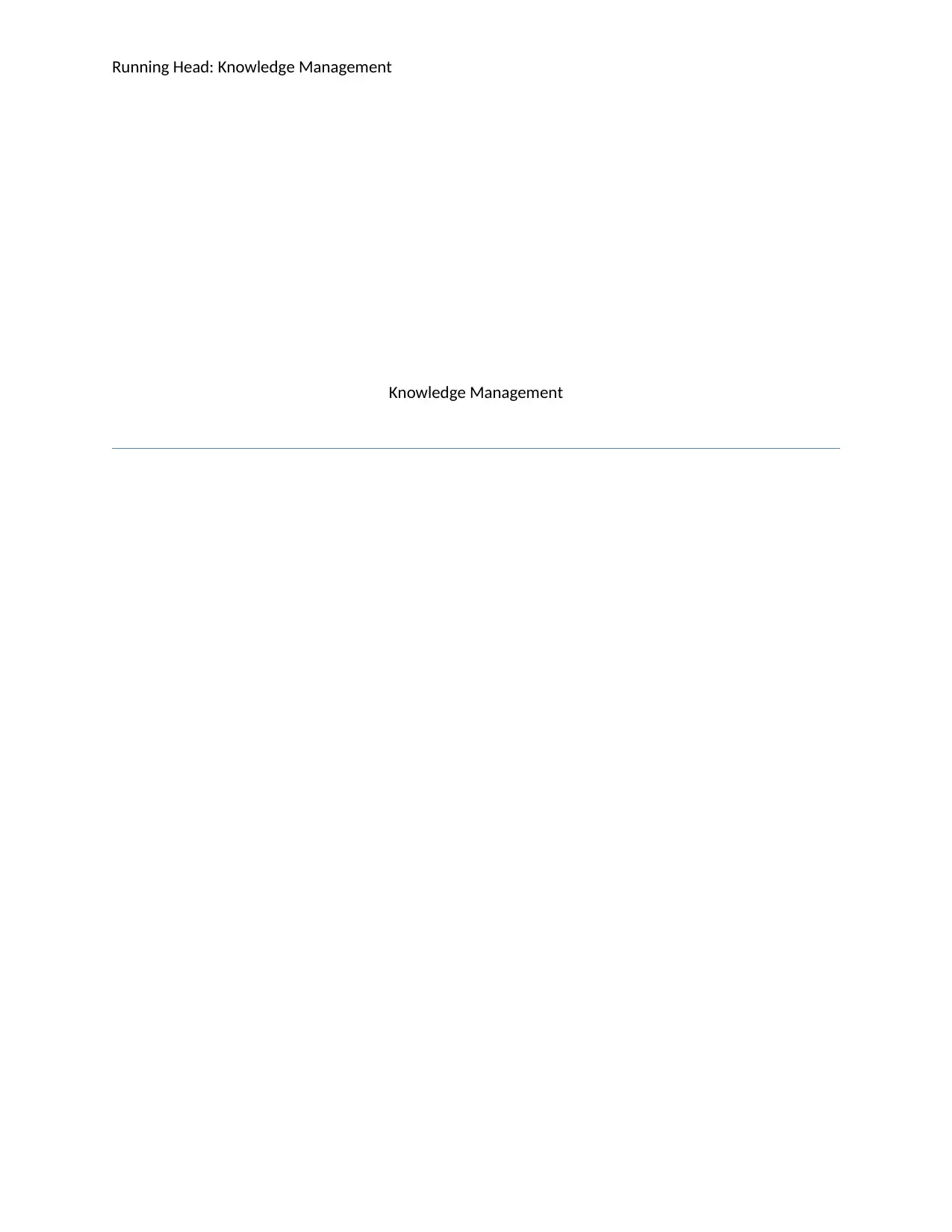
Running Head: Knowledge Management
Knowledge Management
Knowledge Management
Paraphrase This Document
Need a fresh take? Get an instant paraphrase of this document with our AI Paraphraser
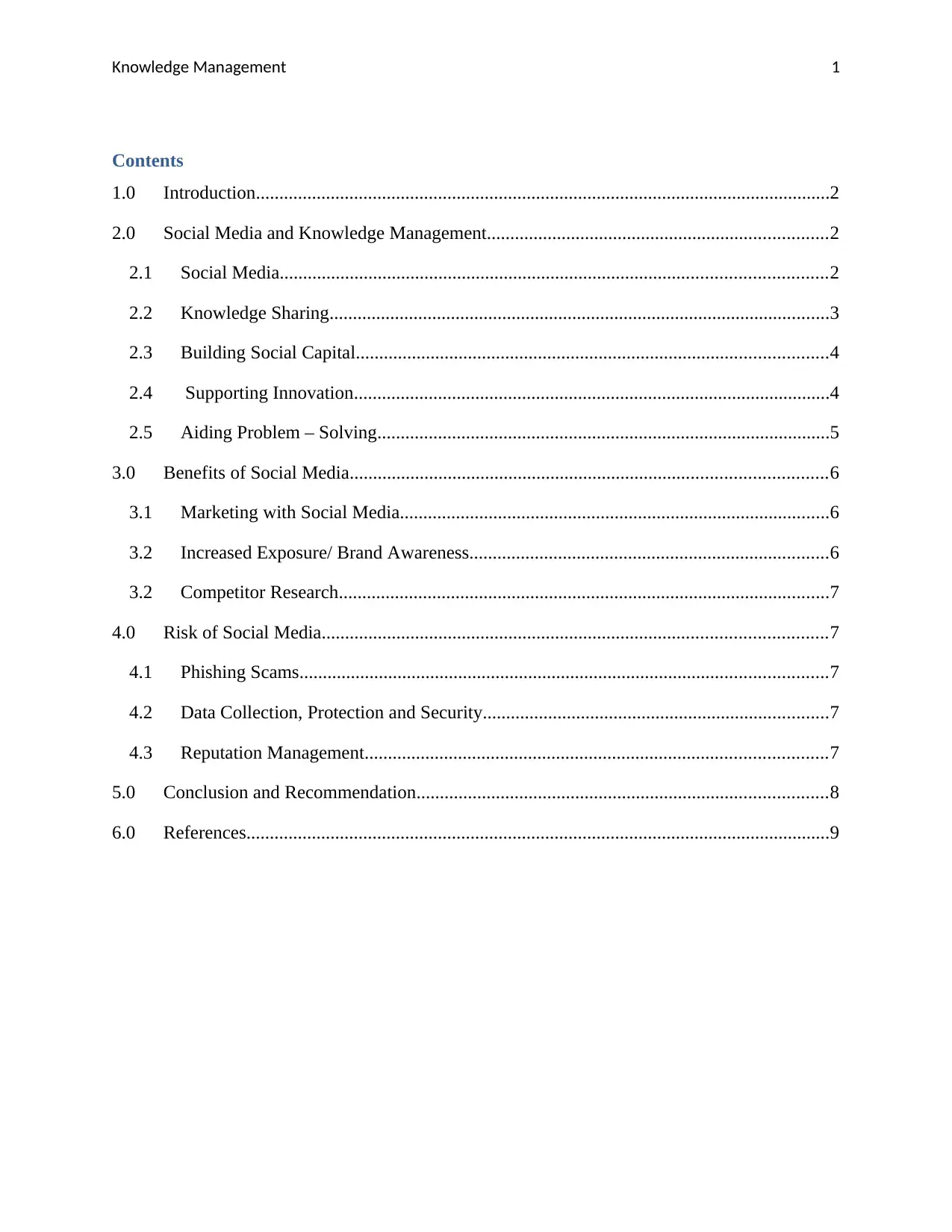
Knowledge Management 1
Contents
1.0 Introduction...........................................................................................................................2
2.0 Social Media and Knowledge Management.........................................................................2
2.1 Social Media.....................................................................................................................2
2.2 Knowledge Sharing...........................................................................................................3
2.3 Building Social Capital.....................................................................................................4
2.4 Supporting Innovation......................................................................................................4
2.5 Aiding Problem – Solving.................................................................................................5
3.0 Benefits of Social Media......................................................................................................6
3.1 Marketing with Social Media............................................................................................6
3.2 Increased Exposure/ Brand Awareness.............................................................................6
3.2 Competitor Research.........................................................................................................7
4.0 Risk of Social Media............................................................................................................7
4.1 Phishing Scams.................................................................................................................7
4.2 Data Collection, Protection and Security..........................................................................7
4.3 Reputation Management...................................................................................................7
5.0 Conclusion and Recommendation........................................................................................8
6.0 References.............................................................................................................................9
Contents
1.0 Introduction...........................................................................................................................2
2.0 Social Media and Knowledge Management.........................................................................2
2.1 Social Media.....................................................................................................................2
2.2 Knowledge Sharing...........................................................................................................3
2.3 Building Social Capital.....................................................................................................4
2.4 Supporting Innovation......................................................................................................4
2.5 Aiding Problem – Solving.................................................................................................5
3.0 Benefits of Social Media......................................................................................................6
3.1 Marketing with Social Media............................................................................................6
3.2 Increased Exposure/ Brand Awareness.............................................................................6
3.2 Competitor Research.........................................................................................................7
4.0 Risk of Social Media............................................................................................................7
4.1 Phishing Scams.................................................................................................................7
4.2 Data Collection, Protection and Security..........................................................................7
4.3 Reputation Management...................................................................................................7
5.0 Conclusion and Recommendation........................................................................................8
6.0 References.............................................................................................................................9
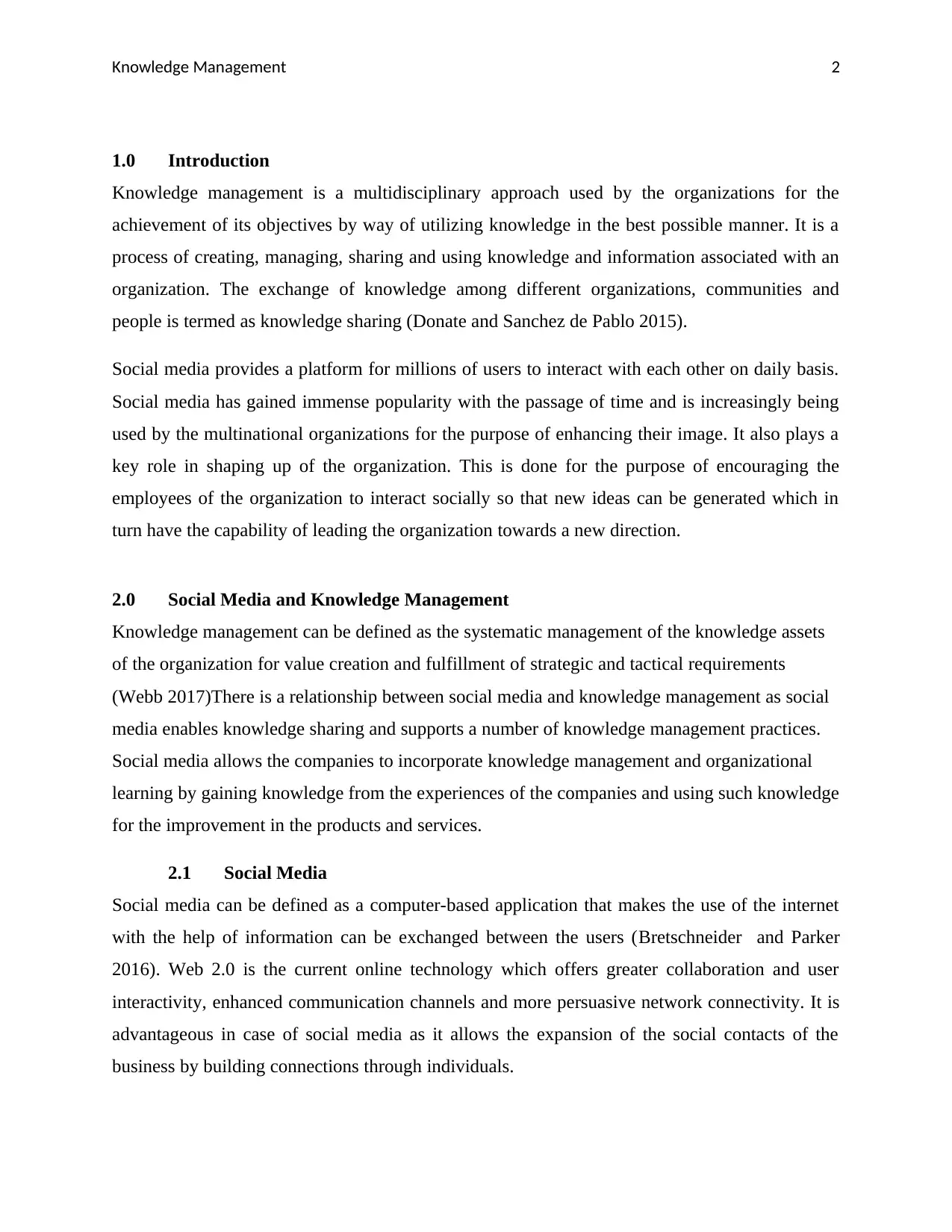
Knowledge Management 2
1.0 Introduction
Knowledge management is a multidisciplinary approach used by the organizations for the
achievement of its objectives by way of utilizing knowledge in the best possible manner. It is a
process of creating, managing, sharing and using knowledge and information associated with an
organization. The exchange of knowledge among different organizations, communities and
people is termed as knowledge sharing (Donate and Sanchez de Pablo 2015).
Social media provides a platform for millions of users to interact with each other on daily basis.
Social media has gained immense popularity with the passage of time and is increasingly being
used by the multinational organizations for the purpose of enhancing their image. It also plays a
key role in shaping up of the organization. This is done for the purpose of encouraging the
employees of the organization to interact socially so that new ideas can be generated which in
turn have the capability of leading the organization towards a new direction.
2.0 Social Media and Knowledge Management
Knowledge management can be defined as the systematic management of the knowledge assets
of the organization for value creation and fulfillment of strategic and tactical requirements
(Webb 2017)There is a relationship between social media and knowledge management as social
media enables knowledge sharing and supports a number of knowledge management practices.
Social media allows the companies to incorporate knowledge management and organizational
learning by gaining knowledge from the experiences of the companies and using such knowledge
for the improvement in the products and services.
2.1 Social Media
Social media can be defined as a computer-based application that makes the use of the internet
with the help of information can be exchanged between the users (Bretschneider and Parker
2016). Web 2.0 is the current online technology which offers greater collaboration and user
interactivity, enhanced communication channels and more persuasive network connectivity. It is
advantageous in case of social media as it allows the expansion of the social contacts of the
business by building connections through individuals.
1.0 Introduction
Knowledge management is a multidisciplinary approach used by the organizations for the
achievement of its objectives by way of utilizing knowledge in the best possible manner. It is a
process of creating, managing, sharing and using knowledge and information associated with an
organization. The exchange of knowledge among different organizations, communities and
people is termed as knowledge sharing (Donate and Sanchez de Pablo 2015).
Social media provides a platform for millions of users to interact with each other on daily basis.
Social media has gained immense popularity with the passage of time and is increasingly being
used by the multinational organizations for the purpose of enhancing their image. It also plays a
key role in shaping up of the organization. This is done for the purpose of encouraging the
employees of the organization to interact socially so that new ideas can be generated which in
turn have the capability of leading the organization towards a new direction.
2.0 Social Media and Knowledge Management
Knowledge management can be defined as the systematic management of the knowledge assets
of the organization for value creation and fulfillment of strategic and tactical requirements
(Webb 2017)There is a relationship between social media and knowledge management as social
media enables knowledge sharing and supports a number of knowledge management practices.
Social media allows the companies to incorporate knowledge management and organizational
learning by gaining knowledge from the experiences of the companies and using such knowledge
for the improvement in the products and services.
2.1 Social Media
Social media can be defined as a computer-based application that makes the use of the internet
with the help of information can be exchanged between the users (Bretschneider and Parker
2016). Web 2.0 is the current online technology which offers greater collaboration and user
interactivity, enhanced communication channels and more persuasive network connectivity. It is
advantageous in case of social media as it allows the expansion of the social contacts of the
business by building connections through individuals.
⊘ This is a preview!⊘
Do you want full access?
Subscribe today to unlock all pages.

Trusted by 1+ million students worldwide
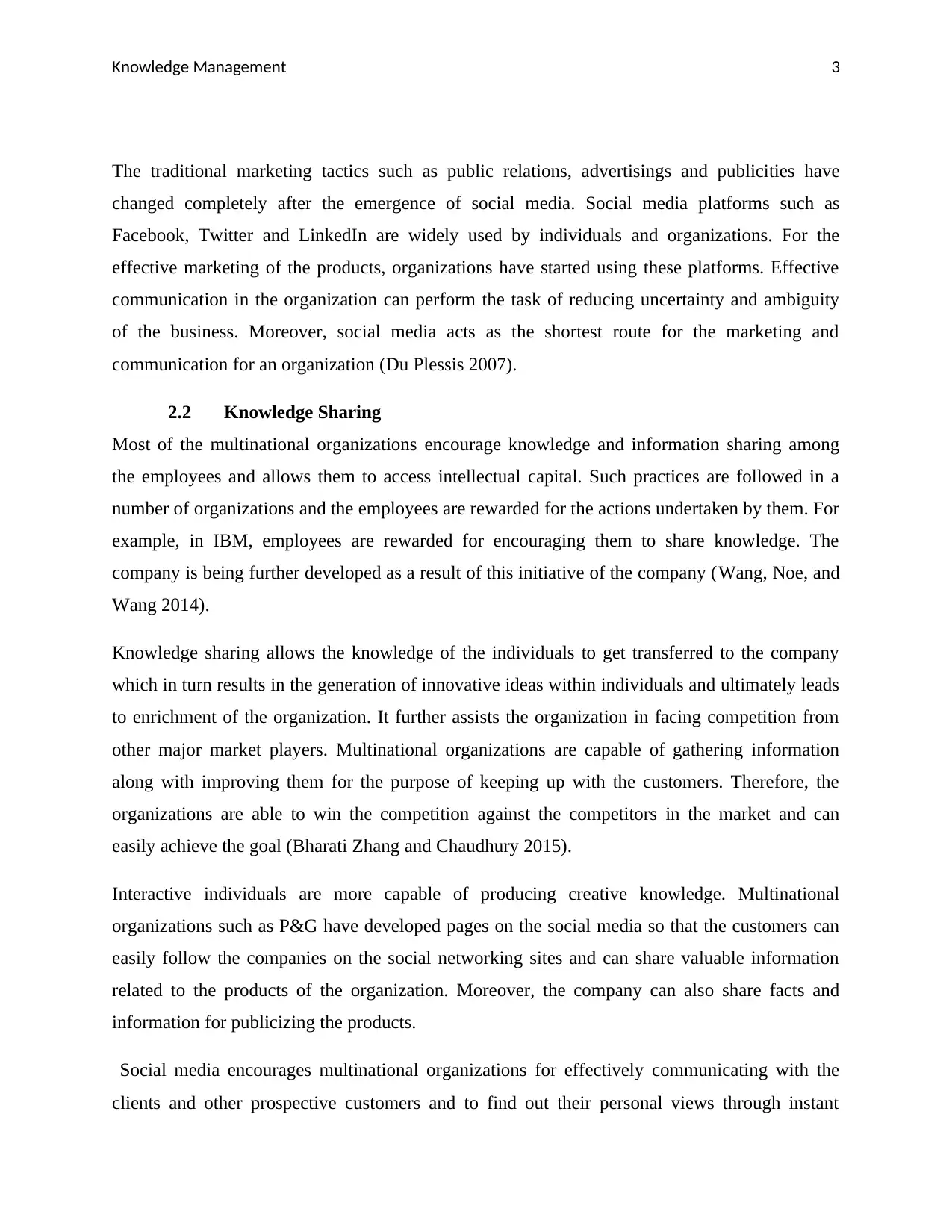
Knowledge Management 3
The traditional marketing tactics such as public relations, advertisings and publicities have
changed completely after the emergence of social media. Social media platforms such as
Facebook, Twitter and LinkedIn are widely used by individuals and organizations. For the
effective marketing of the products, organizations have started using these platforms. Effective
communication in the organization can perform the task of reducing uncertainty and ambiguity
of the business. Moreover, social media acts as the shortest route for the marketing and
communication for an organization (Du Plessis 2007).
2.2 Knowledge Sharing
Most of the multinational organizations encourage knowledge and information sharing among
the employees and allows them to access intellectual capital. Such practices are followed in a
number of organizations and the employees are rewarded for the actions undertaken by them. For
example, in IBM, employees are rewarded for encouraging them to share knowledge. The
company is being further developed as a result of this initiative of the company (Wang, Noe, and
Wang 2014).
Knowledge sharing allows the knowledge of the individuals to get transferred to the company
which in turn results in the generation of innovative ideas within individuals and ultimately leads
to enrichment of the organization. It further assists the organization in facing competition from
other major market players. Multinational organizations are capable of gathering information
along with improving them for the purpose of keeping up with the customers. Therefore, the
organizations are able to win the competition against the competitors in the market and can
easily achieve the goal (Bharati Zhang and Chaudhury 2015).
Interactive individuals are more capable of producing creative knowledge. Multinational
organizations such as P&G have developed pages on the social media so that the customers can
easily follow the companies on the social networking sites and can share valuable information
related to the products of the organization. Moreover, the company can also share facts and
information for publicizing the products.
Social media encourages multinational organizations for effectively communicating with the
clients and other prospective customers and to find out their personal views through instant
The traditional marketing tactics such as public relations, advertisings and publicities have
changed completely after the emergence of social media. Social media platforms such as
Facebook, Twitter and LinkedIn are widely used by individuals and organizations. For the
effective marketing of the products, organizations have started using these platforms. Effective
communication in the organization can perform the task of reducing uncertainty and ambiguity
of the business. Moreover, social media acts as the shortest route for the marketing and
communication for an organization (Du Plessis 2007).
2.2 Knowledge Sharing
Most of the multinational organizations encourage knowledge and information sharing among
the employees and allows them to access intellectual capital. Such practices are followed in a
number of organizations and the employees are rewarded for the actions undertaken by them. For
example, in IBM, employees are rewarded for encouraging them to share knowledge. The
company is being further developed as a result of this initiative of the company (Wang, Noe, and
Wang 2014).
Knowledge sharing allows the knowledge of the individuals to get transferred to the company
which in turn results in the generation of innovative ideas within individuals and ultimately leads
to enrichment of the organization. It further assists the organization in facing competition from
other major market players. Multinational organizations are capable of gathering information
along with improving them for the purpose of keeping up with the customers. Therefore, the
organizations are able to win the competition against the competitors in the market and can
easily achieve the goal (Bharati Zhang and Chaudhury 2015).
Interactive individuals are more capable of producing creative knowledge. Multinational
organizations such as P&G have developed pages on the social media so that the customers can
easily follow the companies on the social networking sites and can share valuable information
related to the products of the organization. Moreover, the company can also share facts and
information for publicizing the products.
Social media encourages multinational organizations for effectively communicating with the
clients and other prospective customers and to find out their personal views through instant
Paraphrase This Document
Need a fresh take? Get an instant paraphrase of this document with our AI Paraphraser
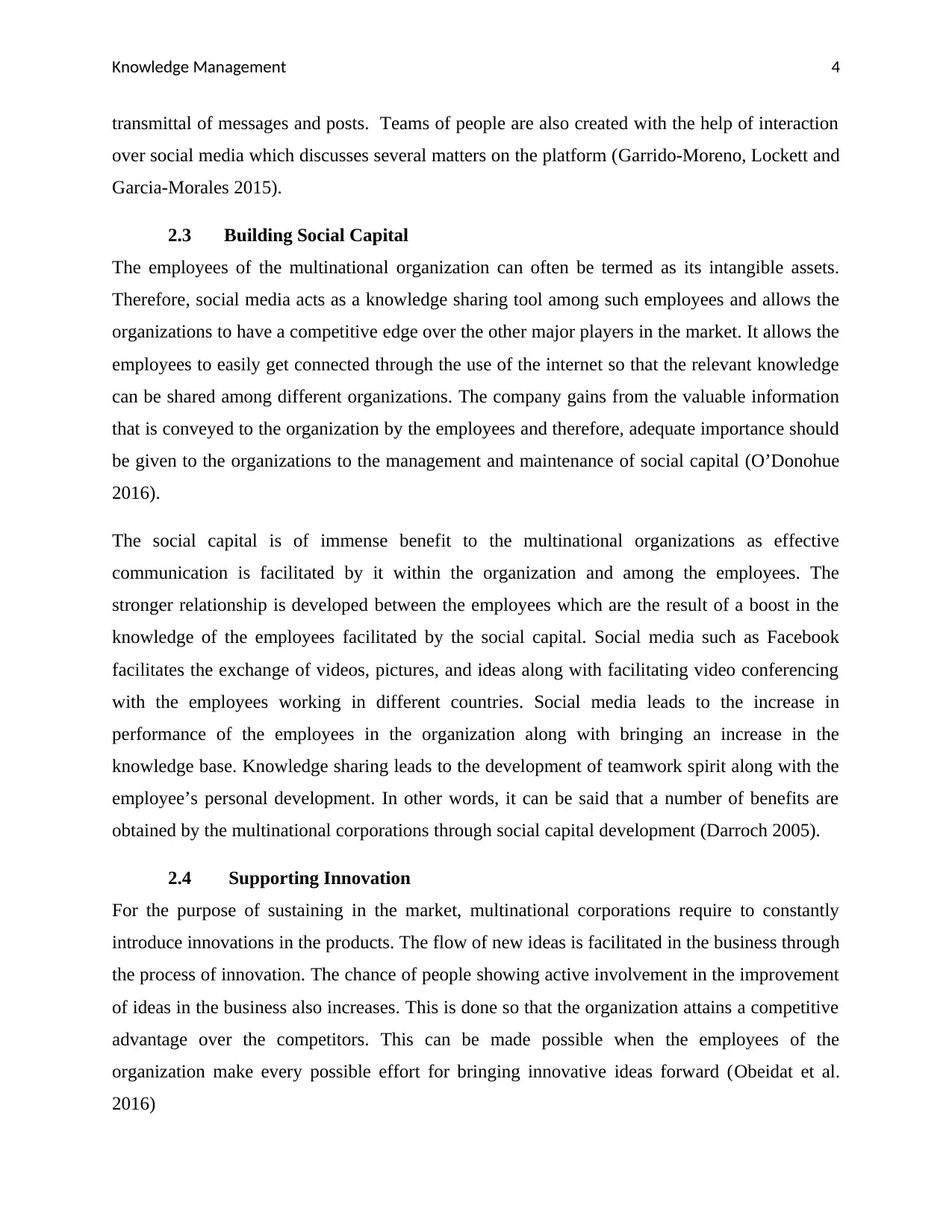
Knowledge Management 4
transmittal of messages and posts. Teams of people are also created with the help of interaction
over social media which discusses several matters on the platform (Garrido-Moreno, Lockett and
Garcia-Morales 2015).
2.3 Building Social Capital
The employees of the multinational organization can often be termed as its intangible assets.
Therefore, social media acts as a knowledge sharing tool among such employees and allows the
organizations to have a competitive edge over the other major players in the market. It allows the
employees to easily get connected through the use of the internet so that the relevant knowledge
can be shared among different organizations. The company gains from the valuable information
that is conveyed to the organization by the employees and therefore, adequate importance should
be given to the organizations to the management and maintenance of social capital (O’Donohue
2016).
The social capital is of immense benefit to the multinational organizations as effective
communication is facilitated by it within the organization and among the employees. The
stronger relationship is developed between the employees which are the result of a boost in the
knowledge of the employees facilitated by the social capital. Social media such as Facebook
facilitates the exchange of videos, pictures, and ideas along with facilitating video conferencing
with the employees working in different countries. Social media leads to the increase in
performance of the employees in the organization along with bringing an increase in the
knowledge base. Knowledge sharing leads to the development of teamwork spirit along with the
employee’s personal development. In other words, it can be said that a number of benefits are
obtained by the multinational corporations through social capital development (Darroch 2005).
2.4 Supporting Innovation
For the purpose of sustaining in the market, multinational corporations require to constantly
introduce innovations in the products. The flow of new ideas is facilitated in the business through
the process of innovation. The chance of people showing active involvement in the improvement
of ideas in the business also increases. This is done so that the organization attains a competitive
advantage over the competitors. This can be made possible when the employees of the
organization make every possible effort for bringing innovative ideas forward (Obeidat et al.
2016)
transmittal of messages and posts. Teams of people are also created with the help of interaction
over social media which discusses several matters on the platform (Garrido-Moreno, Lockett and
Garcia-Morales 2015).
2.3 Building Social Capital
The employees of the multinational organization can often be termed as its intangible assets.
Therefore, social media acts as a knowledge sharing tool among such employees and allows the
organizations to have a competitive edge over the other major players in the market. It allows the
employees to easily get connected through the use of the internet so that the relevant knowledge
can be shared among different organizations. The company gains from the valuable information
that is conveyed to the organization by the employees and therefore, adequate importance should
be given to the organizations to the management and maintenance of social capital (O’Donohue
2016).
The social capital is of immense benefit to the multinational organizations as effective
communication is facilitated by it within the organization and among the employees. The
stronger relationship is developed between the employees which are the result of a boost in the
knowledge of the employees facilitated by the social capital. Social media such as Facebook
facilitates the exchange of videos, pictures, and ideas along with facilitating video conferencing
with the employees working in different countries. Social media leads to the increase in
performance of the employees in the organization along with bringing an increase in the
knowledge base. Knowledge sharing leads to the development of teamwork spirit along with the
employee’s personal development. In other words, it can be said that a number of benefits are
obtained by the multinational corporations through social capital development (Darroch 2005).
2.4 Supporting Innovation
For the purpose of sustaining in the market, multinational corporations require to constantly
introduce innovations in the products. The flow of new ideas is facilitated in the business through
the process of innovation. The chance of people showing active involvement in the improvement
of ideas in the business also increases. This is done so that the organization attains a competitive
advantage over the competitors. This can be made possible when the employees of the
organization make every possible effort for bringing innovative ideas forward (Obeidat et al.
2016)
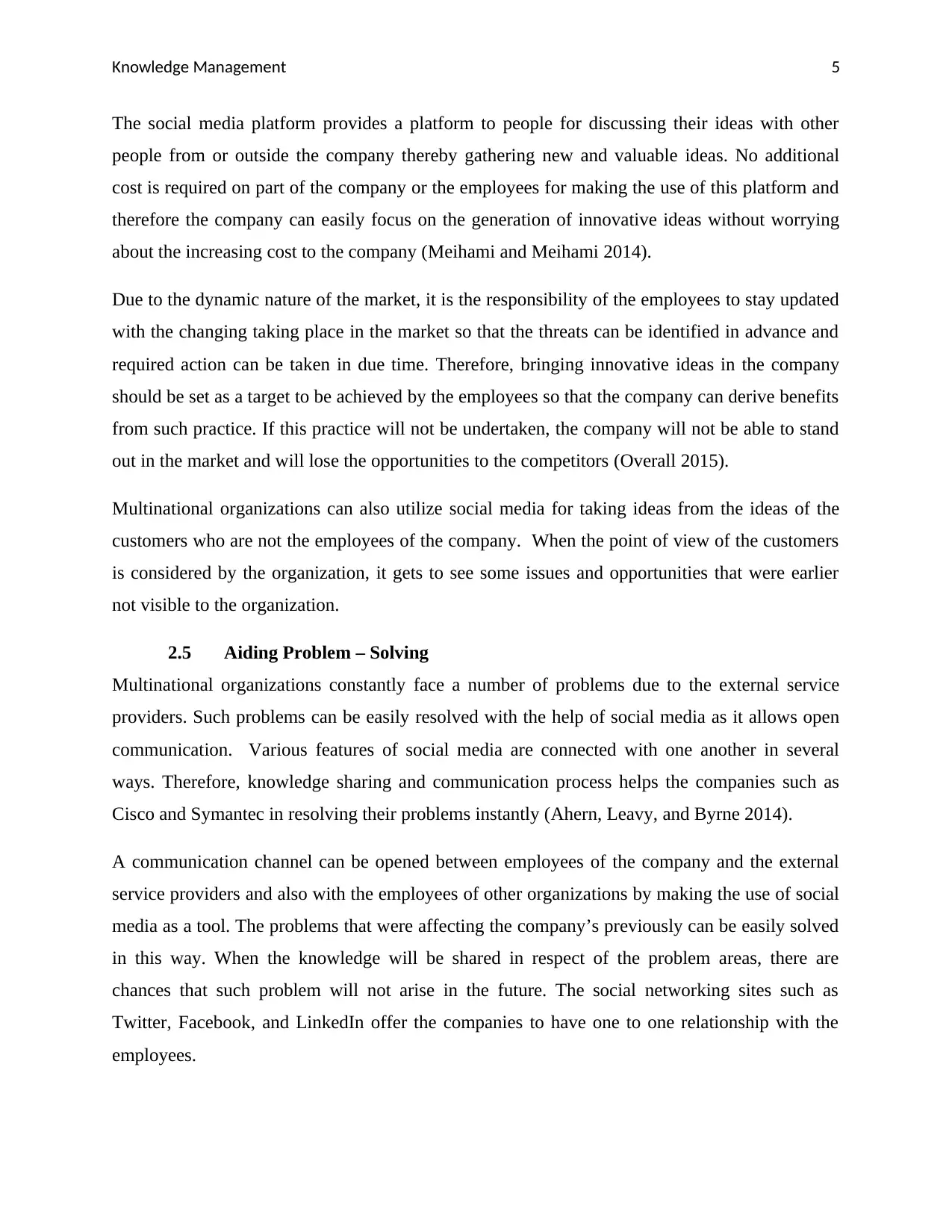
Knowledge Management 5
The social media platform provides a platform to people for discussing their ideas with other
people from or outside the company thereby gathering new and valuable ideas. No additional
cost is required on part of the company or the employees for making the use of this platform and
therefore the company can easily focus on the generation of innovative ideas without worrying
about the increasing cost to the company (Meihami and Meihami 2014).
Due to the dynamic nature of the market, it is the responsibility of the employees to stay updated
with the changing taking place in the market so that the threats can be identified in advance and
required action can be taken in due time. Therefore, bringing innovative ideas in the company
should be set as a target to be achieved by the employees so that the company can derive benefits
from such practice. If this practice will not be undertaken, the company will not be able to stand
out in the market and will lose the opportunities to the competitors (Overall 2015).
Multinational organizations can also utilize social media for taking ideas from the ideas of the
customers who are not the employees of the company. When the point of view of the customers
is considered by the organization, it gets to see some issues and opportunities that were earlier
not visible to the organization.
2.5 Aiding Problem – Solving
Multinational organizations constantly face a number of problems due to the external service
providers. Such problems can be easily resolved with the help of social media as it allows open
communication. Various features of social media are connected with one another in several
ways. Therefore, knowledge sharing and communication process helps the companies such as
Cisco and Symantec in resolving their problems instantly (Ahern, Leavy, and Byrne 2014).
A communication channel can be opened between employees of the company and the external
service providers and also with the employees of other organizations by making the use of social
media as a tool. The problems that were affecting the company’s previously can be easily solved
in this way. When the knowledge will be shared in respect of the problem areas, there are
chances that such problem will not arise in the future. The social networking sites such as
Twitter, Facebook, and LinkedIn offer the companies to have one to one relationship with the
employees.
The social media platform provides a platform to people for discussing their ideas with other
people from or outside the company thereby gathering new and valuable ideas. No additional
cost is required on part of the company or the employees for making the use of this platform and
therefore the company can easily focus on the generation of innovative ideas without worrying
about the increasing cost to the company (Meihami and Meihami 2014).
Due to the dynamic nature of the market, it is the responsibility of the employees to stay updated
with the changing taking place in the market so that the threats can be identified in advance and
required action can be taken in due time. Therefore, bringing innovative ideas in the company
should be set as a target to be achieved by the employees so that the company can derive benefits
from such practice. If this practice will not be undertaken, the company will not be able to stand
out in the market and will lose the opportunities to the competitors (Overall 2015).
Multinational organizations can also utilize social media for taking ideas from the ideas of the
customers who are not the employees of the company. When the point of view of the customers
is considered by the organization, it gets to see some issues and opportunities that were earlier
not visible to the organization.
2.5 Aiding Problem – Solving
Multinational organizations constantly face a number of problems due to the external service
providers. Such problems can be easily resolved with the help of social media as it allows open
communication. Various features of social media are connected with one another in several
ways. Therefore, knowledge sharing and communication process helps the companies such as
Cisco and Symantec in resolving their problems instantly (Ahern, Leavy, and Byrne 2014).
A communication channel can be opened between employees of the company and the external
service providers and also with the employees of other organizations by making the use of social
media as a tool. The problems that were affecting the company’s previously can be easily solved
in this way. When the knowledge will be shared in respect of the problem areas, there are
chances that such problem will not arise in the future. The social networking sites such as
Twitter, Facebook, and LinkedIn offer the companies to have one to one relationship with the
employees.
⊘ This is a preview!⊘
Do you want full access?
Subscribe today to unlock all pages.

Trusted by 1+ million students worldwide
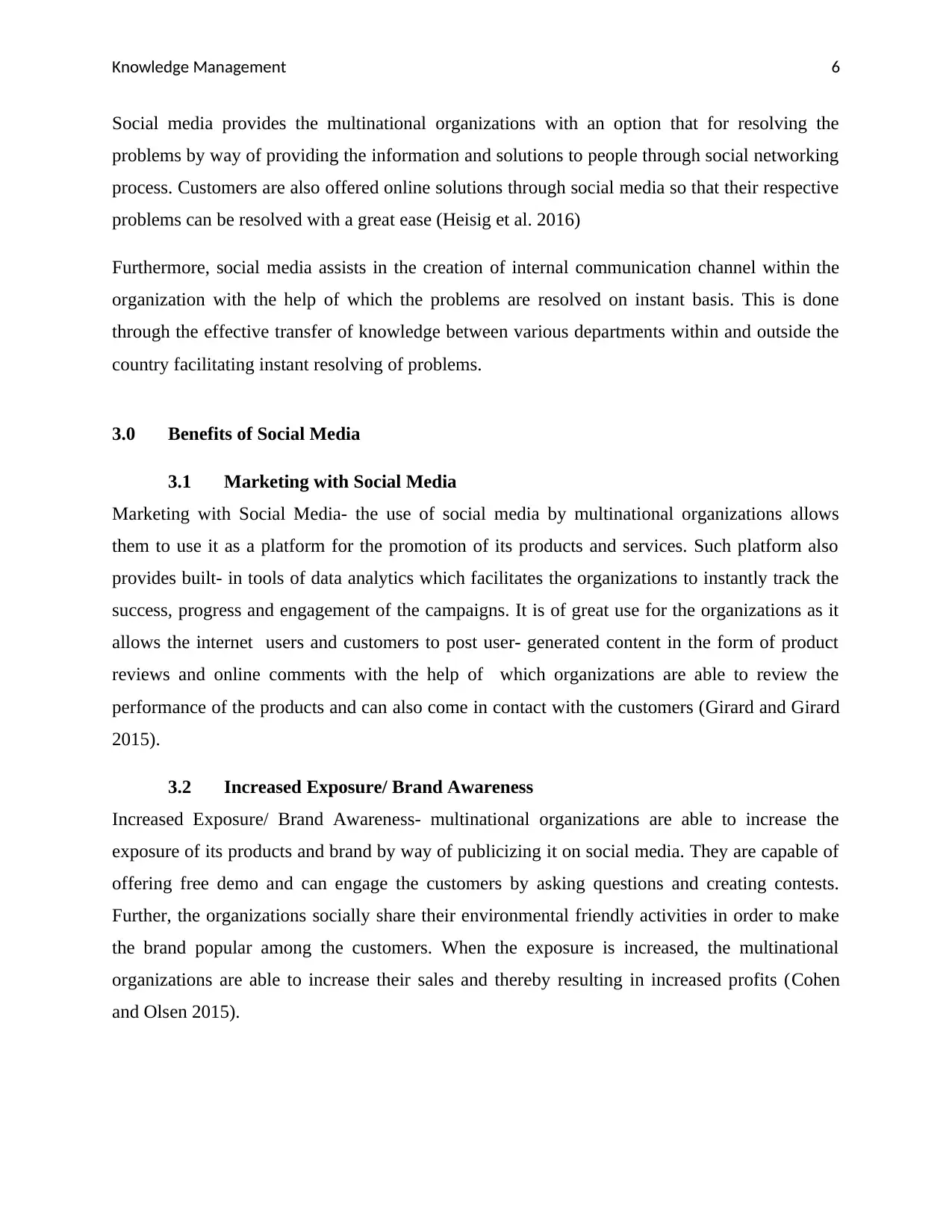
Knowledge Management 6
Social media provides the multinational organizations with an option that for resolving the
problems by way of providing the information and solutions to people through social networking
process. Customers are also offered online solutions through social media so that their respective
problems can be resolved with a great ease (Heisig et al. 2016)
Furthermore, social media assists in the creation of internal communication channel within the
organization with the help of which the problems are resolved on instant basis. This is done
through the effective transfer of knowledge between various departments within and outside the
country facilitating instant resolving of problems.
3.0 Benefits of Social Media
3.1 Marketing with Social Media
Marketing with Social Media- the use of social media by multinational organizations allows
them to use it as a platform for the promotion of its products and services. Such platform also
provides built- in tools of data analytics which facilitates the organizations to instantly track the
success, progress and engagement of the campaigns. It is of great use for the organizations as it
allows the internet users and customers to post user- generated content in the form of product
reviews and online comments with the help of which organizations are able to review the
performance of the products and can also come in contact with the customers (Girard and Girard
2015).
3.2 Increased Exposure/ Brand Awareness
Increased Exposure/ Brand Awareness- multinational organizations are able to increase the
exposure of its products and brand by way of publicizing it on social media. They are capable of
offering free demo and can engage the customers by asking questions and creating contests.
Further, the organizations socially share their environmental friendly activities in order to make
the brand popular among the customers. When the exposure is increased, the multinational
organizations are able to increase their sales and thereby resulting in increased profits (Cohen
and Olsen 2015).
Social media provides the multinational organizations with an option that for resolving the
problems by way of providing the information and solutions to people through social networking
process. Customers are also offered online solutions through social media so that their respective
problems can be resolved with a great ease (Heisig et al. 2016)
Furthermore, social media assists in the creation of internal communication channel within the
organization with the help of which the problems are resolved on instant basis. This is done
through the effective transfer of knowledge between various departments within and outside the
country facilitating instant resolving of problems.
3.0 Benefits of Social Media
3.1 Marketing with Social Media
Marketing with Social Media- the use of social media by multinational organizations allows
them to use it as a platform for the promotion of its products and services. Such platform also
provides built- in tools of data analytics which facilitates the organizations to instantly track the
success, progress and engagement of the campaigns. It is of great use for the organizations as it
allows the internet users and customers to post user- generated content in the form of product
reviews and online comments with the help of which organizations are able to review the
performance of the products and can also come in contact with the customers (Girard and Girard
2015).
3.2 Increased Exposure/ Brand Awareness
Increased Exposure/ Brand Awareness- multinational organizations are able to increase the
exposure of its products and brand by way of publicizing it on social media. They are capable of
offering free demo and can engage the customers by asking questions and creating contests.
Further, the organizations socially share their environmental friendly activities in order to make
the brand popular among the customers. When the exposure is increased, the multinational
organizations are able to increase their sales and thereby resulting in increased profits (Cohen
and Olsen 2015).
Paraphrase This Document
Need a fresh take? Get an instant paraphrase of this document with our AI Paraphraser
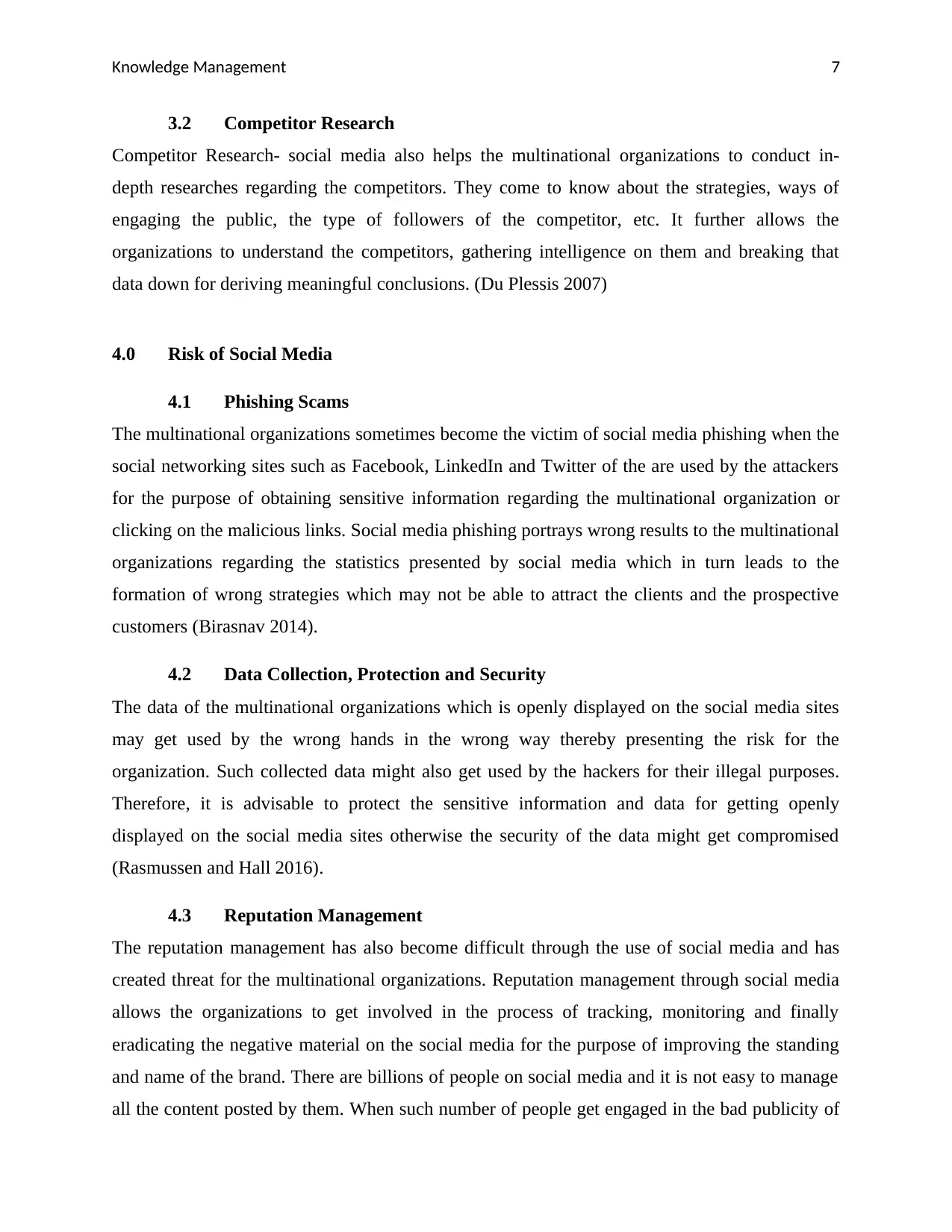
Knowledge Management 7
3.2 Competitor Research
Competitor Research- social media also helps the multinational organizations to conduct in-
depth researches regarding the competitors. They come to know about the strategies, ways of
engaging the public, the type of followers of the competitor, etc. It further allows the
organizations to understand the competitors, gathering intelligence on them and breaking that
data down for deriving meaningful conclusions. (Du Plessis 2007)
4.0 Risk of Social Media
4.1 Phishing Scams
The multinational organizations sometimes become the victim of social media phishing when the
social networking sites such as Facebook, LinkedIn and Twitter of the are used by the attackers
for the purpose of obtaining sensitive information regarding the multinational organization or
clicking on the malicious links. Social media phishing portrays wrong results to the multinational
organizations regarding the statistics presented by social media which in turn leads to the
formation of wrong strategies which may not be able to attract the clients and the prospective
customers (Birasnav 2014).
4.2 Data Collection, Protection and Security
The data of the multinational organizations which is openly displayed on the social media sites
may get used by the wrong hands in the wrong way thereby presenting the risk for the
organization. Such collected data might also get used by the hackers for their illegal purposes.
Therefore, it is advisable to protect the sensitive information and data for getting openly
displayed on the social media sites otherwise the security of the data might get compromised
(Rasmussen and Hall 2016).
4.3 Reputation Management
The reputation management has also become difficult through the use of social media and has
created threat for the multinational organizations. Reputation management through social media
allows the organizations to get involved in the process of tracking, monitoring and finally
eradicating the negative material on the social media for the purpose of improving the standing
and name of the brand. There are billions of people on social media and it is not easy to manage
all the content posted by them. When such number of people get engaged in the bad publicity of
3.2 Competitor Research
Competitor Research- social media also helps the multinational organizations to conduct in-
depth researches regarding the competitors. They come to know about the strategies, ways of
engaging the public, the type of followers of the competitor, etc. It further allows the
organizations to understand the competitors, gathering intelligence on them and breaking that
data down for deriving meaningful conclusions. (Du Plessis 2007)
4.0 Risk of Social Media
4.1 Phishing Scams
The multinational organizations sometimes become the victim of social media phishing when the
social networking sites such as Facebook, LinkedIn and Twitter of the are used by the attackers
for the purpose of obtaining sensitive information regarding the multinational organization or
clicking on the malicious links. Social media phishing portrays wrong results to the multinational
organizations regarding the statistics presented by social media which in turn leads to the
formation of wrong strategies which may not be able to attract the clients and the prospective
customers (Birasnav 2014).
4.2 Data Collection, Protection and Security
The data of the multinational organizations which is openly displayed on the social media sites
may get used by the wrong hands in the wrong way thereby presenting the risk for the
organization. Such collected data might also get used by the hackers for their illegal purposes.
Therefore, it is advisable to protect the sensitive information and data for getting openly
displayed on the social media sites otherwise the security of the data might get compromised
(Rasmussen and Hall 2016).
4.3 Reputation Management
The reputation management has also become difficult through the use of social media and has
created threat for the multinational organizations. Reputation management through social media
allows the organizations to get involved in the process of tracking, monitoring and finally
eradicating the negative material on the social media for the purpose of improving the standing
and name of the brand. There are billions of people on social media and it is not easy to manage
all the content posted by them. When such number of people get engaged in the bad publicity of
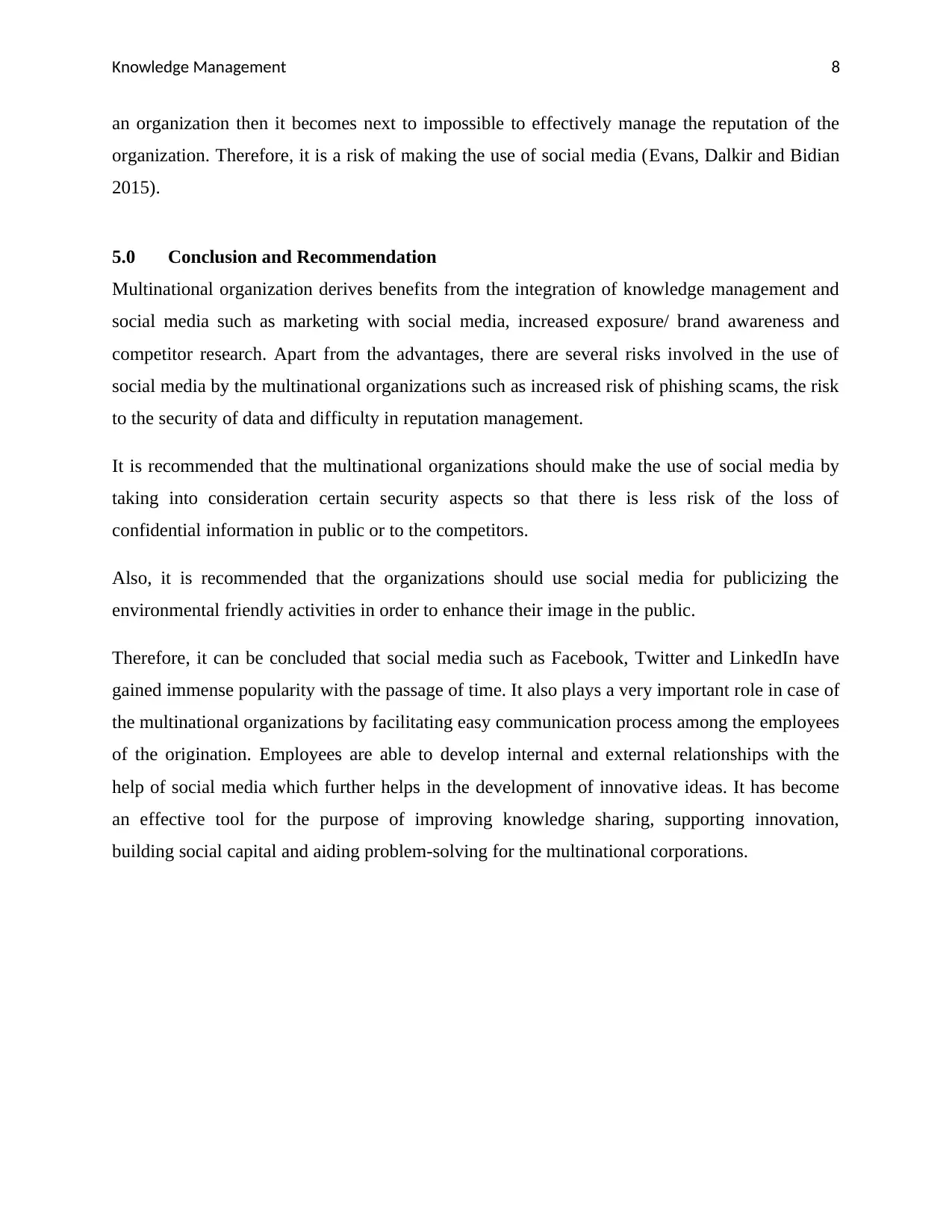
Knowledge Management 8
an organization then it becomes next to impossible to effectively manage the reputation of the
organization. Therefore, it is a risk of making the use of social media (Evans, Dalkir and Bidian
2015).
5.0 Conclusion and Recommendation
Multinational organization derives benefits from the integration of knowledge management and
social media such as marketing with social media, increased exposure/ brand awareness and
competitor research. Apart from the advantages, there are several risks involved in the use of
social media by the multinational organizations such as increased risk of phishing scams, the risk
to the security of data and difficulty in reputation management.
It is recommended that the multinational organizations should make the use of social media by
taking into consideration certain security aspects so that there is less risk of the loss of
confidential information in public or to the competitors.
Also, it is recommended that the organizations should use social media for publicizing the
environmental friendly activities in order to enhance their image in the public.
Therefore, it can be concluded that social media such as Facebook, Twitter and LinkedIn have
gained immense popularity with the passage of time. It also plays a very important role in case of
the multinational organizations by facilitating easy communication process among the employees
of the origination. Employees are able to develop internal and external relationships with the
help of social media which further helps in the development of innovative ideas. It has become
an effective tool for the purpose of improving knowledge sharing, supporting innovation,
building social capital and aiding problem-solving for the multinational corporations.
an organization then it becomes next to impossible to effectively manage the reputation of the
organization. Therefore, it is a risk of making the use of social media (Evans, Dalkir and Bidian
2015).
5.0 Conclusion and Recommendation
Multinational organization derives benefits from the integration of knowledge management and
social media such as marketing with social media, increased exposure/ brand awareness and
competitor research. Apart from the advantages, there are several risks involved in the use of
social media by the multinational organizations such as increased risk of phishing scams, the risk
to the security of data and difficulty in reputation management.
It is recommended that the multinational organizations should make the use of social media by
taking into consideration certain security aspects so that there is less risk of the loss of
confidential information in public or to the competitors.
Also, it is recommended that the organizations should use social media for publicizing the
environmental friendly activities in order to enhance their image in the public.
Therefore, it can be concluded that social media such as Facebook, Twitter and LinkedIn have
gained immense popularity with the passage of time. It also plays a very important role in case of
the multinational organizations by facilitating easy communication process among the employees
of the origination. Employees are able to develop internal and external relationships with the
help of social media which further helps in the development of innovative ideas. It has become
an effective tool for the purpose of improving knowledge sharing, supporting innovation,
building social capital and aiding problem-solving for the multinational corporations.
⊘ This is a preview!⊘
Do you want full access?
Subscribe today to unlock all pages.

Trusted by 1+ million students worldwide
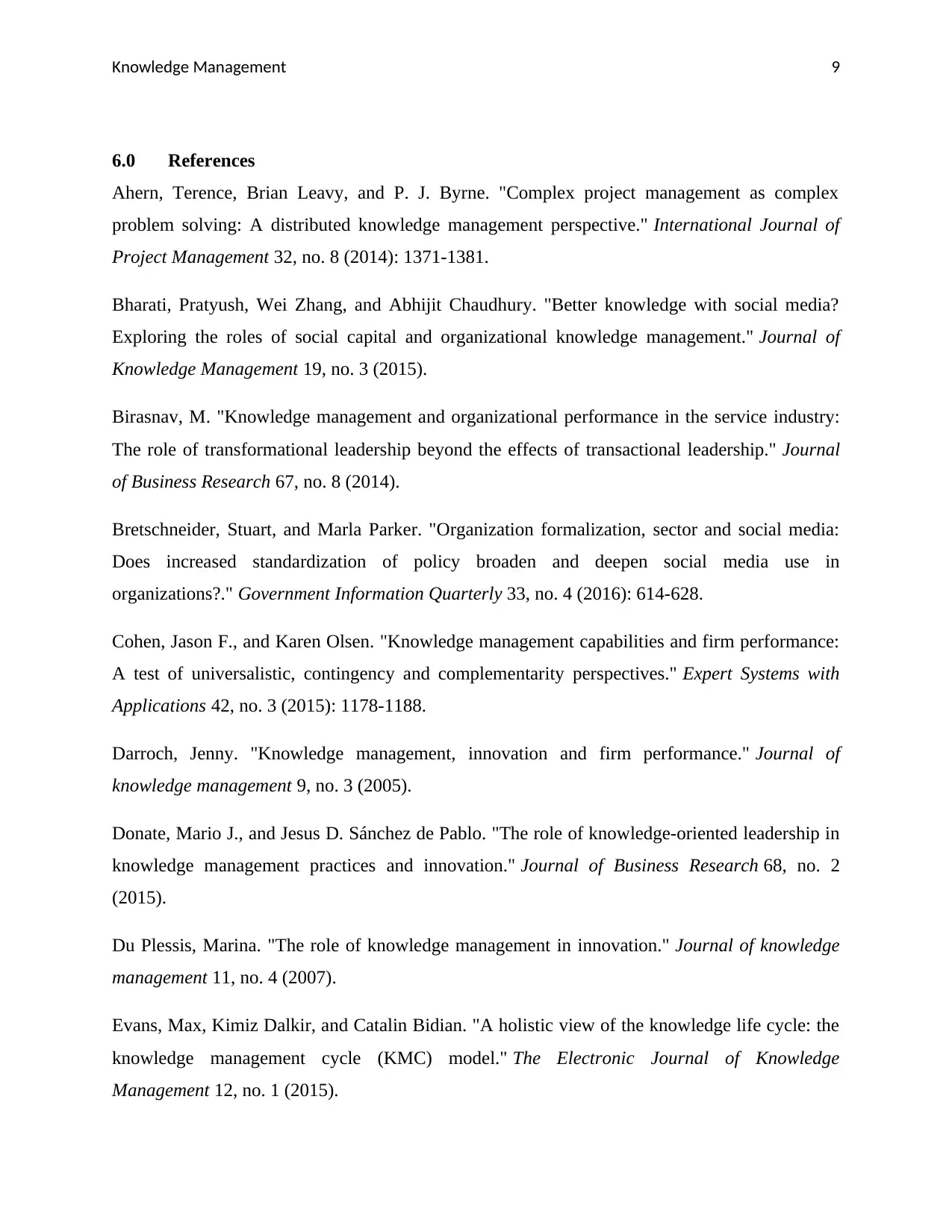
Knowledge Management 9
6.0 References
Ahern, Terence, Brian Leavy, and P. J. Byrne. "Complex project management as complex
problem solving: A distributed knowledge management perspective." International Journal of
Project Management 32, no. 8 (2014): 1371-1381.
Bharati, Pratyush, Wei Zhang, and Abhijit Chaudhury. "Better knowledge with social media?
Exploring the roles of social capital and organizational knowledge management." Journal of
Knowledge Management 19, no. 3 (2015).
Birasnav, M. "Knowledge management and organizational performance in the service industry:
The role of transformational leadership beyond the effects of transactional leadership." Journal
of Business Research 67, no. 8 (2014).
Bretschneider, Stuart, and Marla Parker. "Organization formalization, sector and social media:
Does increased standardization of policy broaden and deepen social media use in
organizations?." Government Information Quarterly 33, no. 4 (2016): 614-628.
Cohen, Jason F., and Karen Olsen. "Knowledge management capabilities and firm performance:
A test of universalistic, contingency and complementarity perspectives." Expert Systems with
Applications 42, no. 3 (2015): 1178-1188.
Darroch, Jenny. "Knowledge management, innovation and firm performance." Journal of
knowledge management 9, no. 3 (2005).
Donate, Mario J., and Jesus D. Sánchez de Pablo. "The role of knowledge-oriented leadership in
knowledge management practices and innovation." Journal of Business Research 68, no. 2
(2015).
Du Plessis, Marina. "The role of knowledge management in innovation." Journal of knowledge
management 11, no. 4 (2007).
Evans, Max, Kimiz Dalkir, and Catalin Bidian. "A holistic view of the knowledge life cycle: the
knowledge management cycle (KMC) model." The Electronic Journal of Knowledge
Management 12, no. 1 (2015).
6.0 References
Ahern, Terence, Brian Leavy, and P. J. Byrne. "Complex project management as complex
problem solving: A distributed knowledge management perspective." International Journal of
Project Management 32, no. 8 (2014): 1371-1381.
Bharati, Pratyush, Wei Zhang, and Abhijit Chaudhury. "Better knowledge with social media?
Exploring the roles of social capital and organizational knowledge management." Journal of
Knowledge Management 19, no. 3 (2015).
Birasnav, M. "Knowledge management and organizational performance in the service industry:
The role of transformational leadership beyond the effects of transactional leadership." Journal
of Business Research 67, no. 8 (2014).
Bretschneider, Stuart, and Marla Parker. "Organization formalization, sector and social media:
Does increased standardization of policy broaden and deepen social media use in
organizations?." Government Information Quarterly 33, no. 4 (2016): 614-628.
Cohen, Jason F., and Karen Olsen. "Knowledge management capabilities and firm performance:
A test of universalistic, contingency and complementarity perspectives." Expert Systems with
Applications 42, no. 3 (2015): 1178-1188.
Darroch, Jenny. "Knowledge management, innovation and firm performance." Journal of
knowledge management 9, no. 3 (2005).
Donate, Mario J., and Jesus D. Sánchez de Pablo. "The role of knowledge-oriented leadership in
knowledge management practices and innovation." Journal of Business Research 68, no. 2
(2015).
Du Plessis, Marina. "The role of knowledge management in innovation." Journal of knowledge
management 11, no. 4 (2007).
Evans, Max, Kimiz Dalkir, and Catalin Bidian. "A holistic view of the knowledge life cycle: the
knowledge management cycle (KMC) model." The Electronic Journal of Knowledge
Management 12, no. 1 (2015).
Paraphrase This Document
Need a fresh take? Get an instant paraphrase of this document with our AI Paraphraser
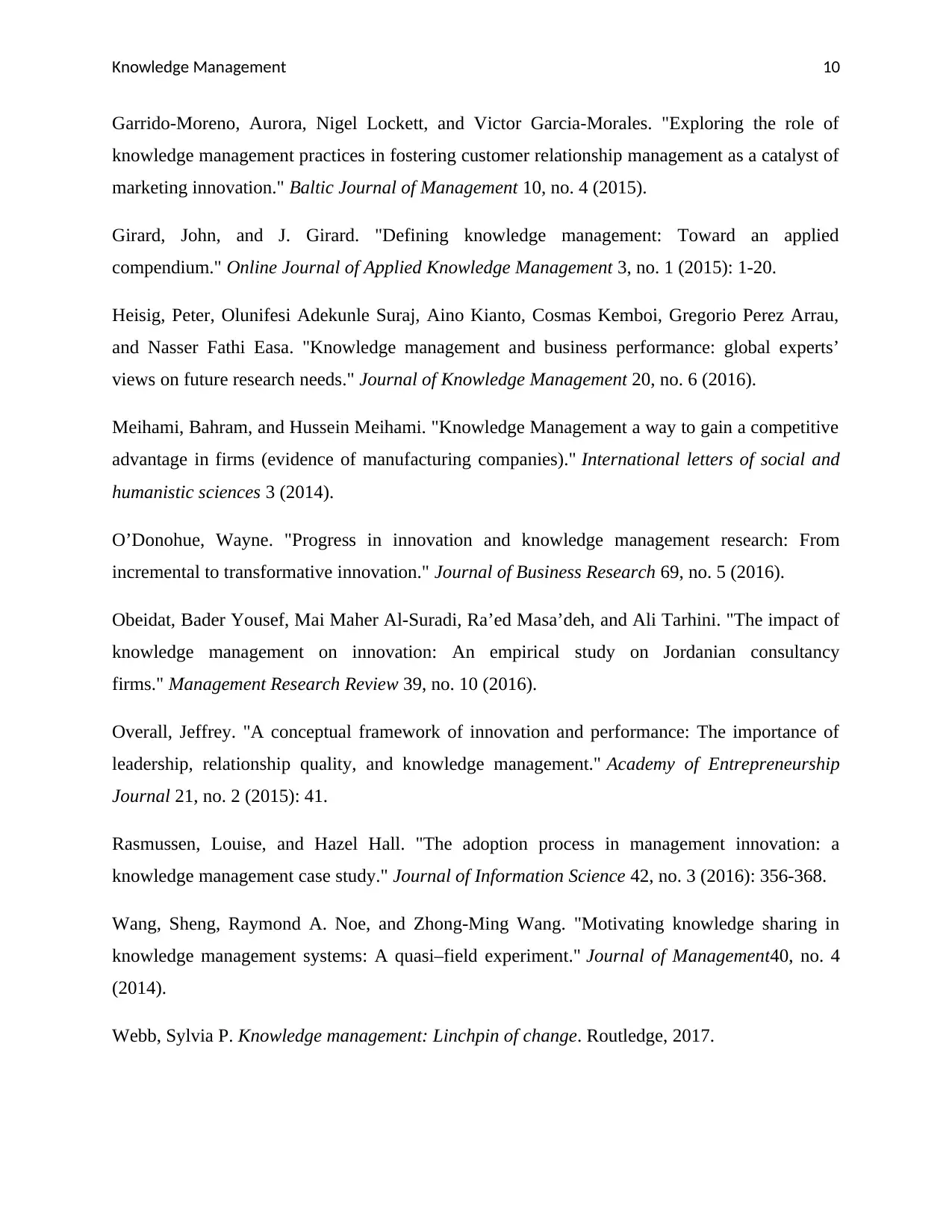
Knowledge Management 10
Garrido-Moreno, Aurora, Nigel Lockett, and Victor Garcia-Morales. "Exploring the role of
knowledge management practices in fostering customer relationship management as a catalyst of
marketing innovation." Baltic Journal of Management 10, no. 4 (2015).
Girard, John, and J. Girard. "Defining knowledge management: Toward an applied
compendium." Online Journal of Applied Knowledge Management 3, no. 1 (2015): 1-20.
Heisig, Peter, Olunifesi Adekunle Suraj, Aino Kianto, Cosmas Kemboi, Gregorio Perez Arrau,
and Nasser Fathi Easa. "Knowledge management and business performance: global experts’
views on future research needs." Journal of Knowledge Management 20, no. 6 (2016).
Meihami, Bahram, and Hussein Meihami. "Knowledge Management a way to gain a competitive
advantage in firms (evidence of manufacturing companies)." International letters of social and
humanistic sciences 3 (2014).
O’Donohue, Wayne. "Progress in innovation and knowledge management research: From
incremental to transformative innovation." Journal of Business Research 69, no. 5 (2016).
Obeidat, Bader Yousef, Mai Maher Al-Suradi, Ra’ed Masa’deh, and Ali Tarhini. "The impact of
knowledge management on innovation: An empirical study on Jordanian consultancy
firms." Management Research Review 39, no. 10 (2016).
Overall, Jeffrey. "A conceptual framework of innovation and performance: The importance of
leadership, relationship quality, and knowledge management." Academy of Entrepreneurship
Journal 21, no. 2 (2015): 41.
Rasmussen, Louise, and Hazel Hall. "The adoption process in management innovation: a
knowledge management case study." Journal of Information Science 42, no. 3 (2016): 356-368.
Wang, Sheng, Raymond A. Noe, and Zhong-Ming Wang. "Motivating knowledge sharing in
knowledge management systems: A quasi–field experiment." Journal of Management40, no. 4
(2014).
Webb, Sylvia P. Knowledge management: Linchpin of change. Routledge, 2017.
Garrido-Moreno, Aurora, Nigel Lockett, and Victor Garcia-Morales. "Exploring the role of
knowledge management practices in fostering customer relationship management as a catalyst of
marketing innovation." Baltic Journal of Management 10, no. 4 (2015).
Girard, John, and J. Girard. "Defining knowledge management: Toward an applied
compendium." Online Journal of Applied Knowledge Management 3, no. 1 (2015): 1-20.
Heisig, Peter, Olunifesi Adekunle Suraj, Aino Kianto, Cosmas Kemboi, Gregorio Perez Arrau,
and Nasser Fathi Easa. "Knowledge management and business performance: global experts’
views on future research needs." Journal of Knowledge Management 20, no. 6 (2016).
Meihami, Bahram, and Hussein Meihami. "Knowledge Management a way to gain a competitive
advantage in firms (evidence of manufacturing companies)." International letters of social and
humanistic sciences 3 (2014).
O’Donohue, Wayne. "Progress in innovation and knowledge management research: From
incremental to transformative innovation." Journal of Business Research 69, no. 5 (2016).
Obeidat, Bader Yousef, Mai Maher Al-Suradi, Ra’ed Masa’deh, and Ali Tarhini. "The impact of
knowledge management on innovation: An empirical study on Jordanian consultancy
firms." Management Research Review 39, no. 10 (2016).
Overall, Jeffrey. "A conceptual framework of innovation and performance: The importance of
leadership, relationship quality, and knowledge management." Academy of Entrepreneurship
Journal 21, no. 2 (2015): 41.
Rasmussen, Louise, and Hazel Hall. "The adoption process in management innovation: a
knowledge management case study." Journal of Information Science 42, no. 3 (2016): 356-368.
Wang, Sheng, Raymond A. Noe, and Zhong-Ming Wang. "Motivating knowledge sharing in
knowledge management systems: A quasi–field experiment." Journal of Management40, no. 4
(2014).
Webb, Sylvia P. Knowledge management: Linchpin of change. Routledge, 2017.

Knowledge Management 11
⊘ This is a preview!⊘
Do you want full access?
Subscribe today to unlock all pages.

Trusted by 1+ million students worldwide
1 out of 12
Related Documents
Your All-in-One AI-Powered Toolkit for Academic Success.
+13062052269
info@desklib.com
Available 24*7 on WhatsApp / Email
![[object Object]](/_next/static/media/star-bottom.7253800d.svg)
Unlock your academic potential
Copyright © 2020–2026 A2Z Services. All Rights Reserved. Developed and managed by ZUCOL.




